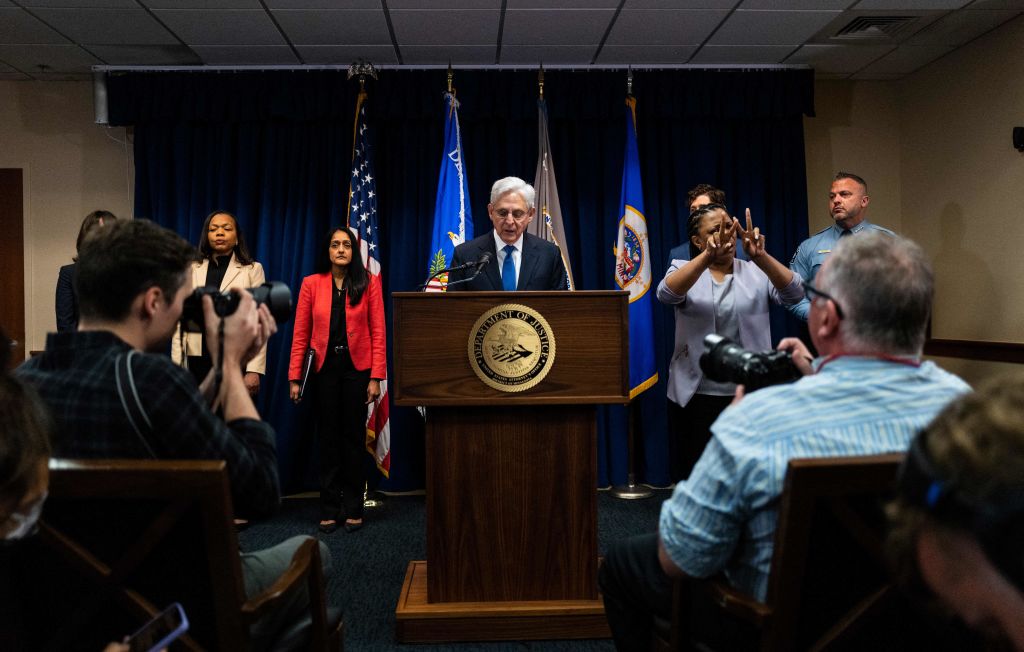
Damning as it was, most of what the U.S. Department of Justice announced about the Minneapolis Police Department on Friday had been documented a year ago by the state of Minnesota’s Department of Human Rights. Each report involved interviews with more than 2,000 people, and describes a police agency rife with excessive force, racial profiling, lack of accountability, military-style training—all the institutional shortcomings that allowed Derek Chauvin to think he could kneel on George Floyd’s neck for nine minutes.
Chauvin after all had done something similar several times before without a word of reproach from a superior, much less another officer, noted Attorney General Merrick Garland from the podium in Minneapolis. He was in town to confirm that the Feds’ probe of what may now be one of the world’s most infamous police departments—an investigation that Garland had announced one day after Chauvin was convicted of Floyd’s murder—had indeed found a “pattern and practice” of policing that violated the Constitution.
“The patterns and practices we observed made what happened to George Floyd possible,” Garland said.
The 89-page report contains more than the metrics—that, for example, a Black motorist in Minneapolis is nearly six times more likely to be pulled over for no reason than a white motorist—that justify federal intervention in the form of a court-enforceable plan, to which the department agreed in principle, to reform an agency that had rotted from the inside.
The report also offers specific glimpses of what that rot looks like.
“For example,” reads page 44, “during a May 2020 protest following the murder of George Floyd, a lieutenant was caught on camera expressing racist assumptions about Black people: ‘I’d love to scatter ’em but it’s time to f—in’ put people in jail and just prove the mayor wrong about his white supremacists from out of state. Although, this group probably is predominantly white, cuz there’s not looting and fires.’ Another officer agreed.” The report notes that the lieutenant oversaw the department’s training in use of force, “a position where he had enormous influence.”
In a Minneapolis precinct station in 2019, officers decorated a Christmas tree with a Newport cigarette pack, malt-liquor cans and a cup from Popeyes. “Super racist stuff,” the report quotes Minneapolis Mayor Jacob Frey lamenting to federal investigators.
At the podium on Friday, Garland highlighted a 2015 traffic stop involving Somali-American teens. At one point, one of them told an officer, “You’re racist, bro.”
“Yep, and I’m proud of it,” the cop replied, adding: “Do you remember what happened in Black Hawk Down when we killed a bunch of you folk? I’m proud of that. We didn’t finish the job over there. If we had, you guys wouldn’t be over here right now.”
Beyond what’s contained in the report, examples abound.
In one instance, even other police officers appear to have taken note of not just the racism but also the idea that expressing it would bring no consequences. In June 2013, in an incident not included in the DOJ report, two off-duty members of the Minneapolis Police Department’s SWAT team, an elite assignment, were drinking in Green Bay, Wis., and ended up in a street confrontation with several Black men. Offended Green Bay police released their incident report, which quotes one of the Minneapolis officers using racist slurs to refer to the other men and reproaching the local officers for not siding with “white guys.” The Minnesota officers, the report makes clear, expected their positions in law enforcement to protect them.
The Green Bay incident would be cited by the attorney for the family of Terrance Franklin, a young Black man killed by Minneapolis SWAT officers the same year, as a possible window into the kind of culture tolerated in the department. Among the substantial evidence the family uncovered challenging the MPD’s account of his death was an audio recording of a SWAT officer shouting, “Come out little n—-r! Don’t go putting those hands up now!” That case, which was likewise not mentioned in the DOJ report, may be under review by the newly installed chief prosecutor for the county that includes Minneapolis. One of the shooters in it had supervised Chauvin in 2017, and allowed him to kneel on a 14-year-old boy for more than 10 minutes, body camera footage showed.
“This is an example of the cancer that has infected this department,” Minneapolis Chief of Police Brian O’Hara said at the April news conference announcing the city was paying $7.5 million to that young victim.
O’Hara took over in Minneapolis in November from Newark, N.J., which also was forced to reform under the auspices of a court-enforced consent decree negotiated with the Justice Department. The Minneapolis department cooperated in the DOJ investigation, and the new report acknowledges that some changes have already been made.
“This is about trying to change the culture around policing,” O’Hara said on Friday, with the Attorney General behind him. “We will emerge as a beacon of light for the rest of the world.”
More Must-Reads from TIME
- Introducing the 2024 TIME100 Next
- The Reinvention of J.D. Vance
- How to Survive Election Season Without Losing Your Mind
- Welcome to the Golden Age of Scams
- Did the Pandemic Break Our Brains?
- The Many Lives of Jack Antonoff
- 33 True Crime Documentaries That Shaped the Genre
- Why Gut Health Issues Are More Common in Women
Contact us at letters@time.com